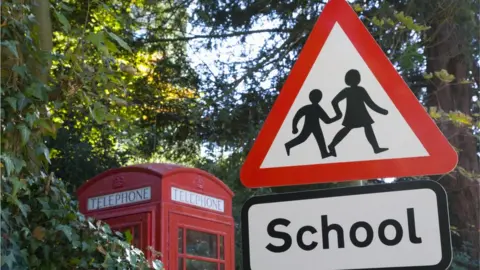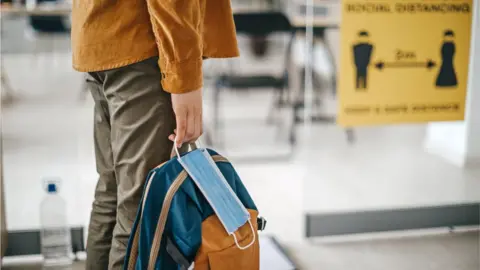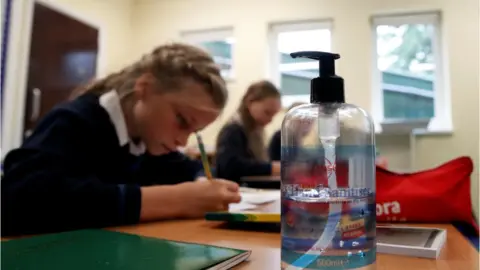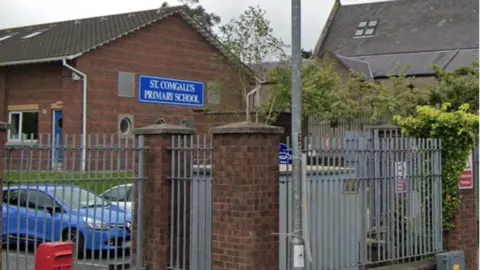Coronavirus: What does it take to close a school?
 Getty/David C Tomlinson
Getty/David C TomlinsonMore than 300,000 children in Northern Ireland returned to classrooms in the first week of September.
Getting them there involved a huge amount of preparation for the Department of Education (DE) and the schools.
But keeping them open may prove even more of a challenge.
A number of schools have reported positive Covid-19 cases among staff or pupils since they began to reopen.
In the majority of cases, specific classes of pupils have been told to self-isolate following advice from the Public Health Agency (PHA).
The school has since made the decision to reopen on Friday.
So when is it necessary to close a school and on whose authority?
Who takes the ultimate decision to close?
The DE told BBC News NI that each school's board of governors is responsible for a decision to close, taking account of advice from the PHA.
Where an exceptional closure is being considered, the school must seek DE approval through the online approval process.
 Getty/mixetto
Getty/mixettoFull details must be provided and there is no guarantee that a request for exceptional closure will be approved, the department said.
When St Comgall's Primary School in Bangor closed, the headteacher said the decision to shut for 14 days was approved "at a higher level".
What does it take to close a school as opposed to simply sending pupils home? What circumstances make full closure necessary?
The DE said that decisions on each school's response to Covid cases is taken based on advice from the PHA, due to their knowledge of both the specific case, or cases, and wider community environment.
In practical terms, the impact on some schools may mean that they need to close for a short period to ensure adequate staffing or to facilitate enhanced cleaning.
On BBC News NI's Evening Extra programme on Monday, Education Minister Peter Weir said the "advice that is given is that where there is someone who has tested positive, the school is to draw up a list of close contacts - those who have been within 2m for 15 minutes or more - and for those individuals, in correspondence with the Public Health Agency, to self-isolate".
 Reuters
Reuters"In the vast majority of cases, it shouldn't be a whole school or for a very lengthy period," he added.
The Education Authority (EA) website says that exceptional closures should only be applied when the PHA advises a school closure is necessary and after engagement with the relevant management authority.
What happens to areas affected by Covid cases?
The DE guidance is that the EA cleaning service should be notified when a Covid-19 case is confirmed.
The normal process is then undertaken of identifying the relevant locations within the school where any incidence of Covid-19 is likely to have happened.
An "enhanced clean" of the locations will be conducted with staff using appropriate PPE (personal protective equipment) and the area can then be used again safely.
A normal cleaning regime then resumes.
Do pupils who go home have to self-isolate? For how long?
Pupils who have been sent home because they are a close contact of a confirmed Covid-19 case are required to isolate for 14 days from the last date of contact.
Do teachers who go home have to self-isolate? For how long?
As with pupils, staff who are affected are also expected to self-isolate for 14 days.
Is there guidance on educating children at home or is this up to the individual school?
Yes, parents should talk directly to their school about provision of education material and schools should continue to operate a contingency plan in the event of a closure.
In the current public health context, schools will wish to have detailed plans in place, the DE said.
The department has provided guidance on supporting remote learning.
Mr Weir has said that if there was any level of suspension it should not affect education.
What about staff or pupils who become symptomatic onsite?
If anyone becomes unwell with a new, continuous cough, a high temperature or anosmia (a loss or a change in your normal sense of smell, which can also affect your sense of taste) in an educational setting, they - and any members of their household within that school setting - must be sent home and should follow the PHA guidance for households with possible coronavirus infection.
Schools should keep a full record of such actions and request a parent, carer or guardian record their acknowledgement of this action.
 Google Maps
Google MapsIf, however, a child does not have symptoms of Covid-19 but has other flu or cold-like symptoms, such as a runny nose, they do not need to be tested and do not need to self-isolate.
The child can go to school if fit to do so.
What is the guidance on general hygiene and physical protection in schools?
- Children will wash hands as soon as they arrive at school and regularly throughout the school day.
- PPE will only be required in a very small number of cases, such as dealing with intimate needs or giving medication.
- Health and Social Care (HSC) staff supporting children in the educational setting may wear PPE in line with HSC Trust guidance.
- PPE should not be worn by children.
- Routine general cleaning should take place at least daily.
- Regular cleaning of door handles, desktops etc will take place throughout the day.
- Schools should remove unnecessary items from classroom, such as soft toys and other learning materials that are hard to clean.
